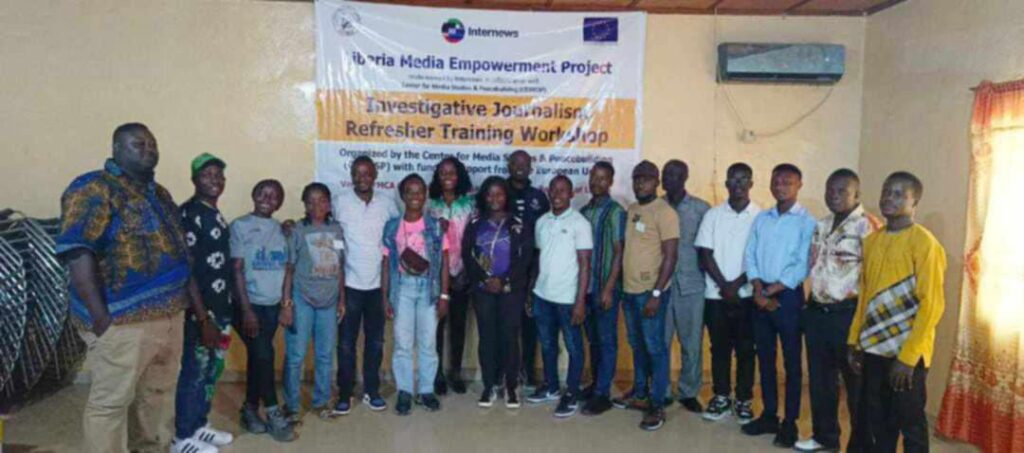By: Stephen N. Sonpon
In an effort to strengthen culpability journalism in Liberia, the Center for Media Studies and Peace Building (CEMESP), in partnership with Internews and with funding from the European Union under the Liberia Media Empowerment Project (LMEP), concluded a two-day intensive refresher training in investigative journalism for top-performing fellows in Gbarnga, Bong County.
The training held on June 13 to 14, brought together over 20 fellows from six of the country’s fifteen counties.
The participants all journalists were drawn based on the recognition of their work especially on impactful reporting on issues ranging from climate change and corruption to governance, human rights, and public interest.
Among other things, The workshop focused on sharpening investigative techniques, sharing experiences from the field, and exploring innovative ways to produce compelling, evidence-based journalism.
The fellows, beneficiaries of investigative reporting grants under LMEP, used the training as a platform to revisit complex issues they’ve previously reported on.
Moreover, They also engaged in advanced discussions around multimedia storytelling, environmental journalism, human rights coverage, and the legal and ethical frameworks guiding investigative work in Liberia.
Facilitators included prominent journalists and legal experts such as Cllr. Alphonsus Zeon, veteran journalist Frank B. Sainworla Jr., and Atty. Alpha Daffae Senkpeni from Local Voices Liberia and UN Women.
At the same time, Participants were exposed to techniques for conducting tough interviews, verifying online content, identifying misinformation, and using digital tools like reverse image search in verification processes.
Speaking at the program, the organization’s finance and administrative officer, Dickson M. Williams, said the refresher training was not only intended to build capacity but also to strengthen collaboration between the fellows and CEMESP’s leadership.
Mr. Williams indicated that this program is more than skills-building rather , it’s about reinforcing accountability and mentorship.
” Some grant funding is still available, and we urge fellows to submit strong investigative pitches for support”, he added.
Additionally, He encouraged the journalists to be persistent, submit stories with societal impact, and make use of their mentors to fine-tune their investigations noting that the program’s final phase would conclude next year.
The fellows from Nimba, Lofa, Montserrado, Rivercess, Margibi and Bong counties praised the partnership between CEMESP and Internews, and acknowledged the European Union’s financial support for providing them the opportunity to tackle in-depth stories that influence public policy.
The training marked another milestone in LMEP’s mission to build a more informed and transparent society through investigative journalism.
As the grant program nears its conclusion, CEMESP and its partners are pushing for stronger results, urging fellows to keep pursuing bold, evidence-driven stories that hold power to account.
